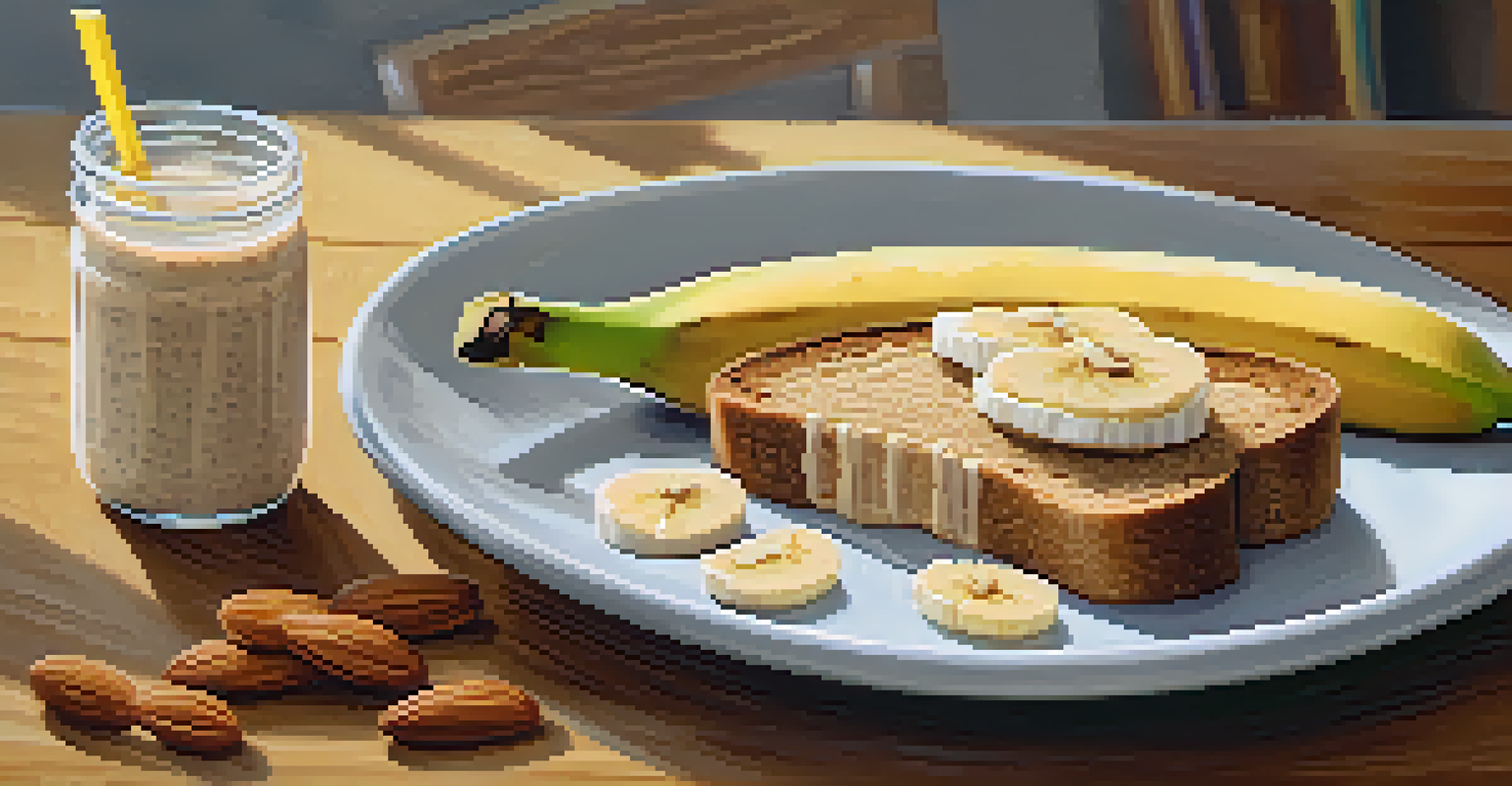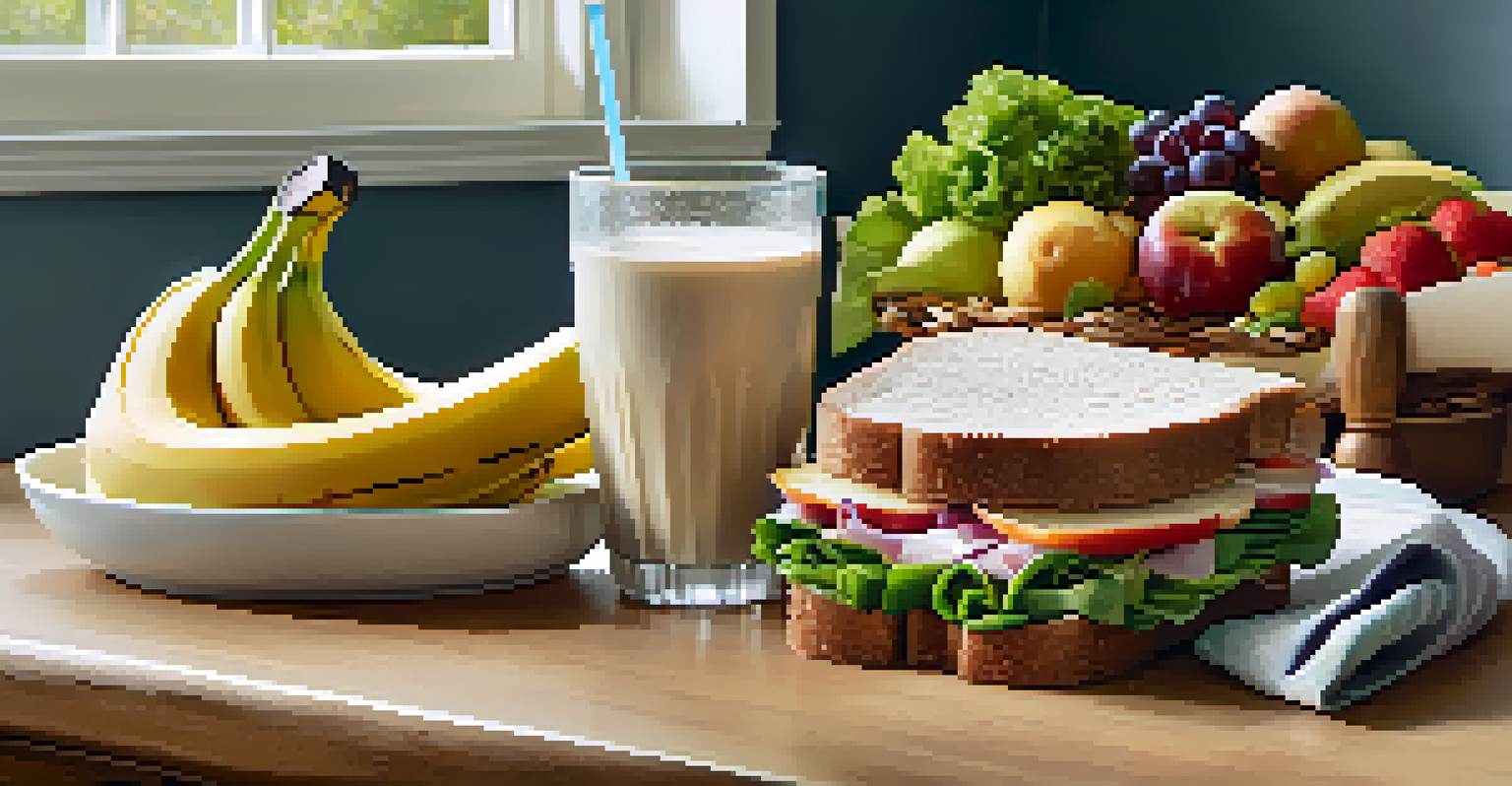Nutrition for High-Intensity Interval Training (HIIT)

Understanding HIIT and Its Nutritional Needs
High-Intensity Interval Training, or HIIT, involves short bursts of intense exercise followed by rest or lower-intensity periods. This demanding workout style relies heavily on your body's energy systems, making nutrition crucial for optimal performance. The right nutritional approach can enhance your energy levels, recovery, and overall fitness results.
Nutrition is not just about what you eat, it's about how you fuel your body to perform at its best.
During HIIT, your body primarily uses glycogen stored in muscles for quick energy. Therefore, a diet rich in carbohydrates is vital to replenish these stores. Think of carbohydrates as your workout fuel, similar to how gasoline powers a car; without it, you won't go far.
In addition to carbs, proteins play a significant role in muscle repair and growth. After a HIIT session, your muscles need to recover, and protein helps facilitate this process. Balancing these macronutrients effectively will set the foundation for your training success.
Pre-Workout Nutrition: Fueling Your HIIT Sessions
What you eat before your workout can significantly impact your performance. Ideally, you should consume a meal or snack rich in carbohydrates 30-60 minutes prior to your HIIT session. This provides the necessary quick energy to power through those intense intervals.

A great pre-workout option could be a banana or a slice of whole-grain toast topped with almond butter. These foods are easy to digest and provide an immediate energy boost, much like charging your phone before heading out for the day.
Nutrition Fuels HIIT Success
Proper nutrition before, during, and after HIIT workouts is essential for optimal performance and recovery.
It's also essential to stay hydrated before your workout. Dehydration can lead to fatigue and decreased performance, so drink water or a low-sugar electrolyte drink to keep your body in peak condition.
Post-Workout Recovery: Nutrition to Replenish
After an intense HIIT workout, your body needs to recover, and nutrition plays a vital role in that process. Consuming a meal or snack that combines both protein and carbohydrates within 30 minutes post-exercise can optimize recovery and muscle growth. This is often referred to as the 'anabolic window.'
The body achieves what the mind believes, but proper nutrition fuels that journey.
A protein shake with a banana or a turkey sandwich on whole-grain bread are excellent options to refuel your body. These foods not only help replenish glycogen stores but also provide the necessary amino acids for muscle repair, much like putting air back into a deflated tire.
Remember, recovery doesn’t stop at just one meal. Consistently incorporating nutrient-rich foods into your diet over the following hours will further enhance recovery and prepare you for your next workout.
Hydration: The Unsung Hero of HIIT Nutrition
Hydration is often overlooked but is a crucial aspect of nutrition for HIIT. When you exercise intensely, you lose fluids through sweat, which can impact your performance and recovery. Staying hydrated helps maintain blood volume, supports muscle function, and enhances overall exercise performance.
It's essential to drink water throughout the day, not just during your workouts. Aim for at least 8-10 cups daily, adjusting for activity levels and sweat loss. Think of water as the oil in a machine; without it, everything can get a bit rusty.
Hydration is Key for Performance
Staying hydrated supports muscle function and overall exercise performance during intense workouts.
In addition to water, consider incorporating electrolyte-rich drinks, especially after intense sessions. These can help replace the minerals lost through sweat, keeping your body balanced and ready for the next challenge.
Meal Timing: Finding Your Perfect Schedule
Understanding meal timing can significantly impact your HIIT performance and recovery. Eating regular meals and snacks throughout the day helps maintain energy levels and ensures your body has the nutrients needed for muscle repair. It’s like keeping a steady stream of gas in your car rather than waiting until you’re on empty.
Try to structure your meals around your workout schedule. For example, if you usually train in the morning, a balanced breakfast including carbs and protein can set the tone for a productive session. If you prefer evening workouts, a light lunch followed by a pre-workout snack can work well.
Listening to your body is key. Adjust your meal timing based on how you feel during workouts, and don’t hesitate to tweak your routine as needed to find what works best for you.
Choosing the Right Foods for HIIT Performance
Not all foods are created equal when it comes to fueling your HIIT workouts. Focus on whole, nutrient-dense foods that provide the energy and nutrients necessary for high-intensity training. Think of your body as a high-performance vehicle; it requires premium fuel for optimal performance.
Incorporate a variety of fruits, vegetables, whole grains, lean proteins, and healthy fats into your meals. Foods like sweet potatoes, quinoa, chicken, and leafy greens can provide the essential nutrients your body craves. It’s not just about eating less; it’s about eating better.
Whole Foods Enhance Workout Results
Focusing on whole, nutrient-dense foods helps provide the energy and nutrients necessary for high-intensity training.
Experiment with different foods to discover what makes you feel your best during workouts. Everyone's body responds differently, so finding your personal 'superfoods' can greatly enhance your HIIT experience.
Supplements: Do You Need Extra Support?
While whole foods should be your primary source of nutrition, some people consider supplements to enhance their HIIT performance. Protein powders, branched-chain amino acids (BCAAs), and creatine are popular options that can support muscle recovery and energy levels. However, it's essential to remember that supplements should complement a balanced diet, not replace it.
Before diving into supplements, assess your dietary habits and specific needs. For instance, if you struggle to meet your protein requirements through food alone, a protein shake might be beneficial. Think of supplements as the icing on the cake; they can enhance the experience but aren’t necessary for everyone.

Always consult with a healthcare professional or a registered dietitian before starting any new supplement regimen. They can provide personalized advice based on your unique goals and health status.